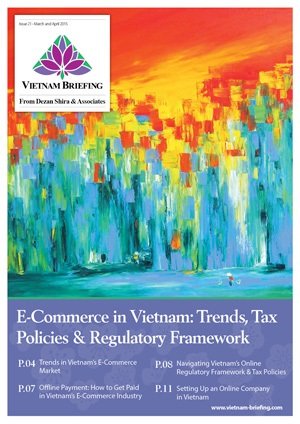Visa Waiver for Citizens of France, Germany, Italy, Spain, and the UK – The Real Impact
For the most up to date information on Vietnam’s visa program see: Vietnam’s Visas and Work Permit Procedures 2022
 By Charles Small, Senior Associate, Dezan Shira & Associates
By Charles Small, Senior Associate, Dezan Shira & Associates
Vietnam appears to be opening up to foreign tourists by waiving visa requirements for citizens of the five EU countries France, Germany, Italy, Spain and the UK from July 1, 2015.
However, it is worth taking a closer look at what this means to the tourism industry in Vietnam, which the World Travel and Tourism Council found contributed 4.6 percent of total GDP in 2014, and forecast to reach 4.8 percent of Vietnam’s total GDP by 2025.
Incentive for a shorter visit
At first glance, it may seem that as Vietnam relaxes visa restrictions, more tourists will come, and Vietnam’s tourism industry will benefit financially.
Certainly, removing requirements for visas makes visiting Vietnam easier. Visitors would no longer have to go through the arduous visa on arrival system, which in reality can take more time than trips to a Consulate or Embassy of Vietnam to apply for a tourist visa in person. Additionally, a financial obstacle is also out of the way – tourists no longer need to pay up to US$125 in government fees for a tourist visa on arrival, and more if an agent is used.
 RELATED: Paying Personal Income Tax in Vietnam: Tax Exemptions and Tax Reductions
RELATED: Paying Personal Income Tax in Vietnam: Tax Exemptions and Tax Reductions
However, reality is never as simple as that. The restriction of the visa waiver period to only 15 days may have negative knock-on effects, as it incentivizes visitors to come to Vietnam for 15 days or under.
The Vietnam National Administration of Tourism (VNAT) found in its latest survey that tourists spend on average approximately US$126 per day in Vietnam, of which a third is spent on accommodation and almost a quarter on food and beverages. As applying for the visa necessary for a 16-day trip could cost as much as the average tourist spends in a single day, the cost of coming to Vietnam for the 16th day would be double that for the 15th, encouraging shorter visits. When considering that VNAT found foreign visitors to spend an average of 9.73 days in Vietnam, the goal should be to bring that number up.
Under the 2014 Law on Entry, Exit, Transit and Residence of Foreigners in Vietnam, the 15 day visa may not be extended in Vietnam, so those who arrive in Vietnam and realize they would prefer an extended stay are not permitted to do so. According to the law, foreigners must wait for at least 30 days from the date of exiting Vietnam before they are permitted to re-enter the country under the visa waiver scheme. By that time, the tourist may no longer even be in ASEAN.
If not Vietnam, where else?
For Italian citizens, other options are:
30 days visa-free: Indonesia, the Philippines, Thailand and Singapore
Three months visa-free: Malaysia
90 days visa-free: Hong Kong, Japan, Singapore, South Korea, Taiwan
Cambodia, Indonesia and Laos offer 30 day visas on arrival, with simpler and cheaper procedures than Vietnam’s visa on arrival. Myanmar offers a 28-day e-visa for tourists.
For UK citizens, other options are:
30 days visa-free: Indonesia, the Philippines, Thailand and Singapore
Three months visa-free: Malaysia
90 days visa-free: Brunei, Japan, and South Korea
180 days visa-free: Hong Kong and Taiwan (extended within Taiwan)
As with Italian citizens, Cambodia, Indonesia and Laos offer UK citizens 30 day visas on arrival, with simpler and cheaper procedures than Vietnam’s visa on arrival. Myanmar also offers the 28-day e-visa for tourists.
What has the scheme done so far?
Vietnam applied the 15 day visa waiver program to citizens of Belarus, Denmark, Finland, Japan, Norway, Russia, South Korea and Sweden on January 1, 2015.
 RELATED: Vietnam Updates Visa Categories, Expands Visa-Free Access
RELATED: Vietnam Updates Visa Categories, Expands Visa-Free Access
In the first five months of 2014 to May, there were a total of 46,001 visitors recorded entering Vietnam with a passport from Denmark, Finland, Norway and Sweden. In the same period in 2015, this has reached 49,016.
The situation is more nuanced than the numbers suggest. There was in fact a 2.4 percent decrease of registered Danish citizens and a 7.3 percent decrease in Norwegian citizens visiting visiting Vietnam over the five months to May 2014 when compared to the same period in 2015. Tellingly, Denmark will not allow dual citizenship until September 1, 2015 and dual citizenship is not permitted in Norway in all cases.
Dual citizenship is possible in both Finland and Sweden, which saw 26.5 and 14.6 percent increases respectively. There is for now correlation between opening up the visa waiver programme to European countries permitting dual citizenship and increased visitor numbers.
As the scheme is applied to UK passport holders, it is worth bearing in mind that according to the UK’s Office of National Statistics, 45.6 percent of non-UK born residents of the country, being 3.4 million people, held a UK passport in 2011. As the UK permits dual citizenship, many of these people will hold a second passport, and will prefer to use the UK passport to visit Vietnam.
The real increase in visitors came from South Korean passport holders – up from 354,984 in January-May 2014 to 480,300 in January-May 2015. This reflects the position of South Korea as Vietnam’s top investor. In Ho Chi Minh City alone, South Korean investment has entered 1,019 projects with US$4 billion of total investment capital.
 RELATED: Dezan Shira & Associates’ Pre-Investment, Market Entry Strategy Advisory
RELATED: Dezan Shira & Associates’ Pre-Investment, Market Entry Strategy Advisory
Considering the amount of time it takes to travel around Vietnam, for logistical reasons tourists on the visa waiver scheme may just stick to the core tourist hubs. Businesses in hotspots like Sapa – an eight hour train journey from Hanoi – may find tourists from countries benefiting from the visa waiver programme staying for a shorter time.
Those in the tourism industry must develop their strategy to suit the needs of the changing market. If you are involved in or considering entering Vietnam’s tourism industry, get in touch with Dezan Shira & Associates Vietnam for expert advice at: vietnam@dezshira.com
|
Asia Briefing Ltd. is a subsidiary of Dezan Shira & Associates. Dezan Shira is a specialist foreign direct investment practice, providing corporate establishment, business advisory, tax advisory and compliance, accounting, payroll, due diligence and financial review services to multinationals investing in China, Hong Kong, India, Vietnam, Singapore and the rest of ASEAN. For further information, please email vietnam@dezshira.com or visit www.dezshira.com. Stay up to date with the latest business and investment trends in Asia by subscribing to our complimentary update service featuring news, commentary and regulatory insight. |
Import and Export: A Guide to Trade in Vietnam
In this issue of Vietnam Briefing Magazine, we provide you with a clear understanding of the current business trends related to trade in Vietnam, as well as explaining how to set up your trading business in the country. We also attempt to give perspective on what will be Vietnam’s place in the Association of Southeast Asian Nations (ASEAN) in 2015, and look at some of the country’s key import and export regulations.
 Tax, Accounting, and Audit in Vietnam 2014-2015
Tax, Accounting, and Audit in Vietnam 2014-2015
The first edition of Tax, Accounting, and Audit in Vietnam, published in 2014, offers a comprehensive overview of the major taxes foreign investors are likely to encounter when establishing or operating a business in Vietnam, as well as other tax-relevant obligations. This concise, detailed, yet pragmatic guide is ideal for CFOs, compliance officers and heads of accounting who need to be able to navigate the complex tax and accounting landscape in Vietnam in order to effectively manage and strategically plan their Vietnam operations.

E-Commerce in Vietnam: Trends, Tax Policies & Regulatory Framework
In this issue of Vietnam Briefing Magazine, we provide readers with a complete understanding of Vietnam’s e-commerce industry. We begin by highlighting existing trends in the market, paying special attention to scope for foreign investment. We look at means for online sellers to receive payment in Vietnam, examine the industry’s tax and regulatory framework, and discuss how a foreign retailer can actually establish an online company in Vietnam.
- Previous Article Vietnam’s Derivatives Market Continues Steady Development
- Next Article State by State: Vietnam and Michigan Trade










